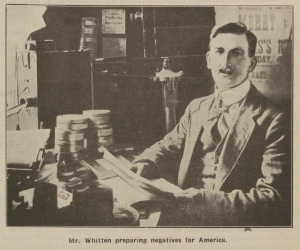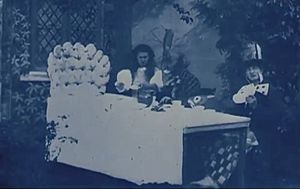Norman Whitten facts for kids
Quick facts for kids
Norman Whitten
|
|
|---|---|
 |
|
| Born |
Norman Hughes Chaplen Whitten
20 October 1881 |
| Died | 3 March 1969 (aged 87) |
| Nationality | English |
| Occupation | Silent film actor Producer Director |
Norman Whitten (born October 20, 1881 – died March 3, 1969) was an English filmmaker. He worked as a producer, director, and actor in the early days of silent films. He was the first actor to play the Mad Hatter character in a movie. This was in the 1903 film Alice in Wonderland. This movie was the first time Lewis Carroll's famous book Alice's Adventures in Wonderland was made into a film. Later, in 1907, he married May Clark, who played Alice in the same movie. Norman Whitten was also a pioneer in making films in Ireland. He created newsreels, comedies, dramas, and even Ireland's first animated film.
Contents
Early Life of Norman Whitten
Norman Whitten was born in Brompton, London, in 1881. He was one of six children. His father, Dr. William John Whitten, was a doctor and surgeon.
Working with Hepworth Films
In 1902, Norman Whitten and his brother Claude became actors. They worked for Cecil Hepworth at the Hepworth Film Studios in Walton-on-Thames, Surrey. The brothers soon took on other jobs behind the scenes. They learned to operate cameras and process film.
While working there, Whitten met May Clark (1885–1971). She was a young actress and became his first wife. May Clark was the first actress to play Alice in a film. This was in Alice in Wonderland (1903).
Marriage and Family Life
Norman and May married on March 14, 1907, in Walton-on-Thames. Their marriage certificate showed both were cinematographers. They had two sons. Vernon Norman William Whitten (1908–1982) later became a film director and cameraman. Their second son was Kenneth Whitten (1918-2016).
After getting married, Norman and May left Hepworth Film Studios. They started their own company called Stamford Hill Film Cleaning Company. They used their skills to repair and clean films. Later, with May's brother Reggie Clark, they formed the County Film Company.
Pioneering Film in Ireland
Around 1913, Whitten and Clark moved to Dublin, Ireland. Norman set up his own film-making business. In 1914, he started his General Film Supply company (GFS). He was the managing director, cameraman, director, editor, and film processor. Whitten had already been making films for ten years. He had many connections in the film world.
GFS Film Productions
GFS created newsreels, advertisements, and propaganda films. They also made films about religious journeys. Whitten even made Ireland's first animated film. These short films were usually shown before the main movie.
In 1917, Whitten filmed the release of Sinn Féin prisoners. These prisoners had been involved in the 1916 Easter Rising. In July 1917, he filmed the Sinn Féin convention. He was able to show his films in local cinemas the same evening. Other companies had to send their films to London for processing.
His film Sinn Féin Review (1919) was seized by police. It was banned by the authorities, who called it propaganda. Whitten believed he was just filming a newsworthy event.
Feature Films and Newsreels
In 1920, Whitten made his first full-length movie, Aimsir Padraig (In the Days of St Patrick). It starred Ira Allen and featured his son Vernon as a young Patrick. The film showed the life of Ireland's patron saint. It was successful internationally.
Whitten also worked as an agent for British film equipment makers. He distributed films in Ireland for other companies. In July 1917, he started Irish Events. This was Ireland's first regular newsreel service. These newsreels were easy to make and became popular in Irish cinemas. By the end of that year, he had made 24 editions.
Business Challenges
May Clark supported Norman throughout his time in Dublin. She managed the business for seven months while he was in the United States. In 1922, Whitten produced some light comedies. These included Casey's Millions, Cruiskeen Lawn, and Wicklow Gold. They starred Irish comedian Jimmy O'Dea. These films were popular with local audiences but are now lost.
When the business struggled, it was sold. Whitten and his family returned to England. There, he started Vanity Fair Pictures with Reggie Clark. May Clark managed the business side of both companies. Around this time, Norman and May's marriage ended.
Later Life and Legacy
Norman Whitten later married Hilda Pleasance (1904–1962) in 1929. In 1939, he and his second wife lived in Ealing, London. Whitten worked as an advertising manager for patent medicines. He was also an ARP Warden. This meant he helped protect people during air raids.
Norman Whitten passed away in 1969 in Ealing, London, at the age of 88.
Filmography
Here are some of the films Norman Whitten worked on:
- Casey's Millions (1922) – Producer
- Cruiskeen Lawn (1922) – Producer
- Wicklow Gold (1922) – Producer
- Aimsir Padraig (In the Days of Saint Patrick) (1920) – Director/Producer
- Sinn Féin Review 1&2 (1919) – Director
- The Honeymoon: First, Second and Third Class (1904) – Actor (played the husband)
- The Neglected Lover and The Stile (1903) – Actor (played the boy)
- The Joke that Failed (1903) – Actor (played the student)
- Alice in Wonderland (1903) – Actor (played Fish/Mad Hatter)
- Peace with Honour (1902) – Actor (played Boer)
 | John T. Biggers |
 | Thomas Blackshear |
 | Mark Bradford |
 | Beverly Buchanan |


